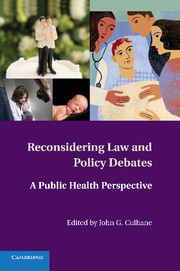Book contents
8 - Punitive Damages and the Public Health Agenda
Published online by Cambridge University Press: 06 December 2010
Summary
INTRODUCTION
Punitive damages have been a feature of civil litigation for centuries. Although they are available in only a small number of cases, the media has given disproportionate attention to punitive damages awards. This high profile has led to much criticism. Indeed, few doctrines in legal history have been more vilified than the doctrine allowing the award of punitive damages in civil actions. In 1873, the Supreme Court of New Hampshire characterized the doctrine as “a monstrous heresy” and “an unsightly and unhealthy excrescence, deforming the symmetry of the body of law.” More recently, a former Solicitor General of the United States, in a 1994 article, compared punitive damages to a “giant underground fungus.” Some observers fear that the amount of punitive damages awards has grown beyond acceptable bounds and, “as if feeding upon itself, has escalated to astronomical figures that boggle the mind” and represents a “destructive force that erodes the economic stability of society.”
Notwithstanding such graphic expressions of outrage, the United States Supreme Court has consistently stated that punitive damages may be awarded in civil actions for the purposes of punishing and deterring defendants under appropriate circumstances. Many, but by no means all, of these cases have been tort actions that have involved personal injuries, or insurance bad faith or fraud claims related to personal injuries.
- Type
- Chapter
- Information
- Reconsidering Law and Policy DebatesA Public Health Perspective, pp. 221 - 254Publisher: Cambridge University PressPrint publication year: 2010
- 1
- Cited by

